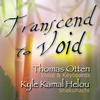This album includes 5 main tracks (Tamuke, Sokkan, Shingetsu, Choshi, Daha)
composed mostly by unknown Fuke monks who played each piece during meditation.
After careful and repeated listening of these pieces, the spirit of each one
reached deep into the soul of both listener and player, making it possible to
imagine the various improvisations of bumblebee sound, ostinato, a simple
melodic bass pattern matching the shakuhachi monody, like the early practices
that appeared successively in the Western music history, going from modal
structures to polyphony. The choice once made, gave rise to quite a natural
voice, guided by the addition of bass lines while preserving the shakuhachi part
in its entirety.
The voice is here utilized as an instrumentally, illustrating a quote from Rudolf Steiner: "The pure song should delete every word"
In addition to the five main shakuhachi classics, other tracks are divided between improvisations, reappropriation and composition:
1. Tamuke "Ta" means hands, "Muke" means facing each other, or hands put
together, which indicates solidarity within oneself and one's community. In
solidarity we experience unity and in unity we experience transition and
movement of energy from one body to another. This piece is played to commemorate
the transition from one phase to another. It is also a eulogy and a requiem for
the departed souls of loved ones. It is a melody that brings indescribable
stillness deep into the heart.
2. While High - Improvisation
3. Sokkan - This piece can be translated as "breath-sight". It is played as a
meditation and observation of the process of breathing the most essential human
activity. When breath is observed, respected, and self-controlled, harmony and
peace begin.
4. Transcend to Void - Improvisation
5. Shingetsu - "Shin" indicates the heart, the mind, and the spirit. "Getsu"
indicates moon. The moon is symbolic of enlightenment and one's discovery of the
truthful and sincere pathway in life. There is a certain level of effort that
one must exert in order to cultivate, toil and refine diligently one's
excellence and purity in mind, body, and spirit.
6. Secret - Improvisation
7. Tsukikusa - Improvisation
8. Choshi - "Cho" is refers to "searching", and "Shi" is refers to oneself. This
piece is played to allow the player to tune to the instrument and the
surrounding. It is the joining of Mind/Spirit/Instrument at the beginning of
each meditation session.
9. Morning mist - Improvisation
10. Greensleevses - traditionnal English (Henry VIII)
11. Daha - "Da" means to tear apart, to break and to strike, "Ha" means wave.
The striking waves along the seashores are a symbol of the infinite adversities
that we need to overcome in our daily lives. Yet, the constant pounding of the
waves along the sea rocks provides a constant process of cleansing and
rejuvenation. Daha is played for the increased will power, humility, and
determination to overcome those adversities. A peaceful dream
- Kyle Kamal Helou



